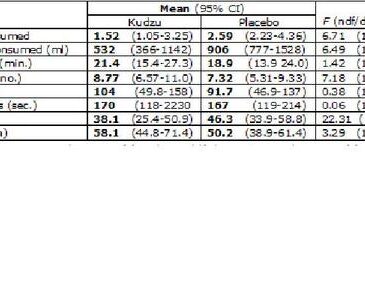People who have problems with excessive alcohol consumption often turn to various behavioral and psychopharmacological treatment strategies to reduce their drinking. Recently, in their search of treatments for alcohol use and dependence, researchers have turned to alternative therapies, including herbal medicines such as the Kudzu plant, which was used in Chinese herbal medicine as early as 600 AD to treat alcohol-related illnesses (Lukas et al., 2005). This week’s DRAM reviews a recent study by Lukas, Penetar, Berko, Vicens, Palmer, Mallya, Macklin, and Lee (2005) that tested the effect of a 7-day kudzu treatment on drinking behaviors.
In this study, researchers monitored the drinking behavior of 14 participants (11 male, 3 female) in a natural laboratory setting. During the course of the double-blind study participants took one seven-day course of Kudzu1 extract and one seven-day course of placebo; these week-long treatments were separated by a two or three week period when participants took no medication. Researchers excluded potential participants from the study if they admitted to alcohol abuse or dependence, had a family history of alcohol abuse or dependence, pregnancy, and currently used medication, including oral birth control pills. Compliance with instructions for taking the medication was measured by using urine and blood tests during course of treatment.
Study participants attended four research sessions in the natural laboratory, each lasting 90 minutes. During these sessions, participants had access to beverage alcohol. The first session was used to introduce participants to the laboratory space and protocol. After the first session each person was given a pharmacological “treatment”, kudzu or placebo, to take for seven days; participants returned at the end of that treatment period for a second session. The third session took place two or three weeks later to determine whether participants had returned to their baseline drinking levels. Participants were then given whatever medication they did not initially receive, placebo or kudzu, to take for seven days before they returned for the fourth and final session.
The natural laboratory resembled a studio apartment including a kitchen with refrigerator stocked with beer, juice, and bottled water. Before each session, participants were tested for illicit drugs, alcohol, and pregnancy. Researchers measured participants’ drinking patterns using an end table with a built-in digital scale upon which a tile was placed. Between each sip participants were instructed to place their drink on the tile2; the scale was connected to a device that recorded changes in weight over 1g. Each factor measured in the study is described in the Figure.

Figure. Summary of treatment group differences (adapted from Lukas et al., 2005). Click image to enlarge.
* ndf = numerator degrees of freedom; ddf denominator degrees of freedom.
Treatment group differences included least-squares means with 95% CIs for each treatment group and the F statistic for the treatment group comparison with associated numerator and denominator degrees of freedom and p value from a linear mixed model.
Blood and urine tests suggest that all participants complied with Kudzu and placebo treatments; these tests also revealed that kudzu did not alter liver function, hematology or blood chemistry. On average, after a seven-day Kudzu treatment, participants drank fewer beers, a smaller volume of alcohol, imbibed a larger number of sips per beer and consumed less volume per sip. Kudzu also appeared to delay time to first sip of the second beer. Overall kudzu appeared to slow drinking patterns, so a person who could drink six beers on placebo only drank four beers in the same period of time on kudzu.
Of the 11 participants who completed the study, eight drank less while being treated with Kudzu, two drank an equivalent amount as on placebo, and one drank one beer more than on placebo. Thus, the results of the study demonstrate that a seven-day treatment with kudzu extract can significantly reduce the volume and speed at which people drink in a simulated natural environment. These findings are strengthened by the fact that each person served as his/her control.
Lukas et al. infer that kudzu prolongs and/or intensifies the effect of the first beer, thus postponing or eliminating the desire to drink subsequent beers; as a result, participants drank fewer beers. This finding could be important in developing effective treatments to reduce binge drinking, and perhaps help people trying to quit drinking prevent slips (e.g., one beer) from becoming lapses (i.e., prolonged drinking).
There are a few limitations to the study, such as the small sample size and the gender imbalance. Also, if the mechanism that mediates the observed effect is prolonging or intensifying the alcohol effects, Kudzu potentially could cause problems. If people become more quickly intoxicated after consuming less alcohol, Kudzu might not be a safe treatment. Given the preliminary nature of this research, more investigation is necessary.
Further research might try to determine whether stronger doses of kudzu would have a more marked effect, and whether a stronger dose would cause adverse consequences. Researchers also might try to determine whether Kudzu causes any long-term adverse health consequences. Lastly, it also would be important to determine whether people abuse or are dependent on alcohol respond similarly to Kudzu. Despite these limitations, the results of this study suggest that kudzu can have a favorable impact on reducing the volume of alcohol consumed without negative consequences.
What do you think? Please use the comment link below to provide feedback on this article.
Notes
1. 500mg tablets (19% puerarin, 4% daidzin, 2% daidzein); two 500mg tablets were taken twice daily.
2. Participants do not know that there is a scale built into the table.
References
Lukas, S. E., Penetar, D., Berko, J., Vicens, L., Palmer, C., Mallya, G., et al. (2005). An extract of the Chinese herbal root Kudzu reduces alcohol drinking by heavy drinkers in a naturalistic setting. Alcoholism: Clinical & Experimental Research, 29(5), 756-762.




